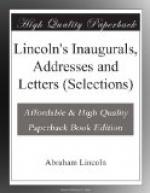First Republican State Convention. The reference is to a meeting held in Springfield, which was addressed by Owen Lovejoy. Lincoln was not present on this occasion. Recent investigation seems to show that there was no foundation for the charge that this was exclusively a meeting of Abolitionists, but that it included many men who held the same political views as Lincoln. Douglas honestly believed that the resolutions read by him at the Ottawa meeting were genuine and he was greatly chagrined at the mistake.
By an amendment. This amendment was offered by Douglas.
THE COOPER INSTITUTE ADDRESS.
This address, Lincoln’s first important direct message to the people of the East, was very carefully prepared. The text in this volume is taken from The Tribune Tract, issued as a campaign document.
The Northwestern Territory. The district comprising the present States of Ohio, Illinois, Indiana, Michigan, and Wisconsin, had been ceded to the national government by the original States.
“Black Republicans.” Douglas constantly referred to his opponents under this title. In the Ottawa Debate he affirmed that in 1854 Lincoln and Trumbull had arranged to form “an Abolition party, under the name and disguise of a Republican party.”
“Popular sovereignty.” This principle is defined by Douglas as follows: “My principle is to recognize each State of the Union as independent, sovereign, and equal in its sovereignty.”
Harper’s Ferry! John Brown! John Brown was a New Englander, who had taken an active part in the Kansas disorders in 1856. During the summer of 1859 he engaged in an attempt to free the slaves of Virginia. After capturing the Arsenal at Harper’s Ferry, he was overpowered by a body of marines and with the survivors of his “army,” was hanged. By the extreme anti-slavery people he was regarded as a martyr, the best expression of this spirit being given by Mrs. Julia Ward Howe’s “Battle Hymn of the Republic.” In a speech in Congress of January 16, 1860, Senator Douglas had stated his “firm and deliberate conviction that the Harper’s Ferry crime was the natural, logical, inevitable result of the doctrines and teachings of the Republican party.”
The Southampton insurrection. The reference is to a slave insurrection which occurred in 1831 in Southampton, Va.
Helper’s Book. Hinton P. Helper, a North Carolinian of the so-called poor white class, was the author of a book on the effects of slavery, entitled The Impending Crisis in the South. The special reference is to the recent agreement among sixty-four Republican representatives to publish a compendium of the book for circulation in doubtful States.
THE FAREWELL SPEECH.
This beautiful little address was delivered from the platform of the car that bore the President-elect away from his old home. It has been preserved in two slightly differing versions, neither of which probably exactly reproduces the words used. The Springfield papers, which were followed by Herndon, gave an inaccurate report that robbed the speech of much of its rare beauty.




